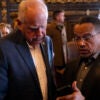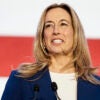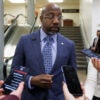LONDONDERRY, N.H.—Parents, educators, and voters expressed concern over the role of the federal government in education during a summit today in New Hampshire.
Attendees, panelists, and speakers said that parents, communities, and states need to have a larger role in solving what event organizers called the “education crisis” facing the nation.
The 2015 Education Summit was hosted by The 74, a non-profit education news website, and sponsored by the American Federation for Children, an organization that advocates school choice.
Campbell Brown, co-founder and editor-in-chief of The 74, moderated interviews with several Republican presidential candidates.
A panelist at the event, Joel Klein, chief executive of Amplify and the former chancellor of the New York City Department of Education, said that he is excited about bringing innovation to an outdated education system.
“We’ve transformed the world in the last 20 years. For a guy like me to be tweeting is unimaginable.”
Klein believes there is a “gravitational pull towards the status quo” in education because “the risk of innovation is failure.”
He said kids in failing schools are too often dismissed as “other people’s kids.”
Another panelist, Roland Fryer, a professor of economics and founder of the Education Innovation Laboratory at Harvard University, said providing parents and students with choices in education isn’t enough. They must be provided with good choices.
“If you give me a choice between a rotten piece of chicken and a rotten piece of beef, that’s not a choice,” Fryer said.
Amy Threewitt, a member of the board of directors for PublicSchoolOptions.org, told The Daily Signal that school choice is a promising solution to education issues facing the country because “kids have different needs.”
“Parents know their children better than anyone else,” Threewitt said. “They know what’s best.”
Tillie Elvrum, president of PublicSchoolOptions.org, told The Daily Signal that “trusting parents should be key to any change.”
Elvrum said that innovation and allowing parents to make more choices for their children could “change the face of education.”






























